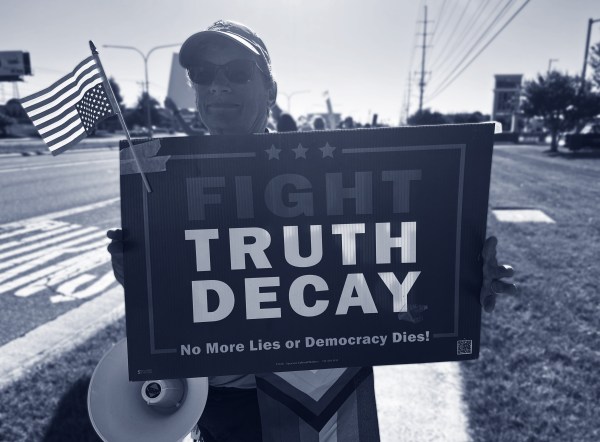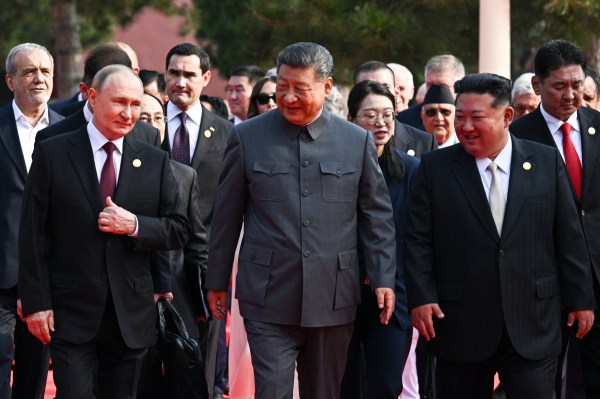For my Evangelical readers, let me begin with a quick question. If I told you that the chief of staff to the former president of the United States was a committed Christian, would you think that a good thing?
If you answered yes, then you’d likely also believe it was a good thing that one of the former president’s personal lawyers was so openly and proudly Evangelical that this was her pinned tweet (the tweet you put at the top of your Twitter profile): “I’m going on record now: If they try to cancel Christianity, if they try to force me to apologize or recant my Faith, I will not bend, I will not waver, I will not break. On Christ the solid Rock I stand. And I’m proud to be an American.”
You might then be overjoyed to know that one of the Republican Party’s most prominent young senators was so theologically literate that he once wrote in Christianity Today, (a flagship Evangelical publication) a thought-provoking essay about how Pelagianism has corrupted our culture.
Indeed, in the Christian conservative movement of my youth, this triple achievement—an Evangelical chief of staff, an Evangelical presidential lawyer, and a rising-star Evangelical intellectual senator—would have been viewed as a triumph for the church and for the nation. Indeed, as a kid I remember being thrilled when I learned a famous athlete, celebrity, or leading politician shared my faith.
Why? For two reasons. First, to borrow a line that you more often hear from the Left, representation matters. When you see someone like you at the heights of culture it signals that you have a place in this land. And I grew up at a time when Evangelicals were perceiving the walls of elite culture closing in, and that our place in the culture (and even our religious liberty) was increasingly tenuous.
And many of those concerns were real. I did not spend the first two decades of my professional life litigating against imaginary wrongs. Christian student groups were being tossed off campus. Newspapers were being confiscated by colleges and thrown in the trash. College professors were being denied career opportunities because of their politics and faith. Many of those legal concerns continue to this day. The defense of liberty requires constant vigilance.
Second, we cheered the ascent of Christians to the height of power because we believed—in our heart of hearts—that they shared basic moral and political commitments that were good for our country. To simplify the analysis, the presence of outspoken, unashamed Evangelicals in the halls of power meant good people exercising godly discernment and wisdom to do good things for the country we love.
But let’s revisit our three examples above. The first person I’m referring to is former White House Chief of Staff Mark Meadows. At a critical moment in American history, his Christianity manifested itself in a fervent, faith-filled effort to steal an American election—an effort fueled by an avalanche of lies.
Do you doubt his faith motives? Here’s one of his texts to Ginni Thomas, the wife of Justice Clarence Thomas:
This is a fight of good versus evil . . . Evil always looks like the victor until the King of Kings triumphs. Do not grow weary in well doing. The fight continues. I have staked my career on it. Well at least my time in DC on it.
Then we have the second person, Trump attorney Jenna Ellis. Few people spewed more outright falsehoods about the presidential election than Ellis. If you doubt that for a moment, I’d urge you to read this complaint filed against her at the Colorado Supreme Court.
The last person is Missouri Sen. Josh Hawley, and this picture is worth a thousand words:
Last month, I published a Sunday essay that made a number of people extremely angry. It was called “The Seeds of Political Violence Are Being Sown in Church.” In the piece I noted that Michael Flynn, a man who called for martial law to help overturn the election, was packing churches across America as part of a “ReAwaken America” tour that was so thoroughly Christian that it was sponsored by one of Pentecostal Christianity’s most important publications, Charisma News.
The response to my essay can best be described as “volcanic.” But not because I got my facts wrong. The threats I described in the piece are real. The attendance of thousands upon thousands of Christians at those rallies is real. Flynn’s record is well-documented. The recent record of religiously motivated political violence was very real.
(While the Twitter response was furious, I got a number of private messages from prominent Christians who told me that, if anything, I’d understated the problem. I often find a distinct difference in the public and private responses to my pieces.)
If I could distill the anger about that essay down to a single sentence (besides simply, “Shut up!”) it would be this: “You talk about the problems in Christian conservatism too much. Talk about the Left more.”
And I get it. I really do. In a deeply divided nation where millions of people have convinced themselves that the church is under unprecedented siege, you want Christians who possess a public platform to “defend the church.” There is a deep and profound human desire for advocacy. It’s one reason why clients often bond so deeply with their attorneys.
Yet that’s not remotely the model of biblical discourse, especially of how believers talk to each other. And while none of us can remotely compare ourselves to biblical giants, we can learn from their model, which is clear: Early church fathers were far, far more concerned with the faith and virtue of the church than the maladies of the Romans.
Indeed, we forget a fundamental truth—our own maladies often make us unable to see the world clearly. Or, as Jesus said, “You hypocrite, first take the plank out of your own eye, and then you will see clearly to remove the speck from your brother’s eye.” In so many ways, we’ve become the People of the Plank, blind to the pain we’ve inflicted on the public even as we try desperately to protect ourselves from them.
This is a confession, by the way. Here’s a bitter personal pill I’ve had to swallow—I carried my own partisan plank for years. As I wrote in my book, at my most partisan moment I once gave a speech in which I said words that shame me to this day.
I was speaking at a conservative conference in California just before I deployed to Iraq, and someone asked me why I volunteered to deploy when I was “doing so much” here at home to defend free speech and religious liberty. I responded, “I believe the two greatest threats to the United States are university leftists at home and jihadists abroad.”
It was a remarkably silly statement. No, it was worse than silly. It was immoral. It was slander by association. Before I deployed, I had lived in some of the bluest neighborhoods in America. I went to school there, worshiped freely there, made friends there, and raised kids there. I had profound disagreements with many of my neighbors—and still disagree with many of their preferred policies—but I had a good life.
In Iraq, the reality was so profoundly different that words can barely begin to describe all the distinctions. I don’t want to list all the atrocities that al Qaeda inflicted on the people of Diyala Province, but I’ll just say that everything you saw ISIS do in Syria, al Qaeda did first in Iraq.
I didn’t exactly become post-partisan upon my return (that came later), but I gained the perspective that permitted me to start the process of pulling the plank from my own eye. Believe me, it takes time. I’m still trying to get it right.
But as I’ve struggled to pull the plank away, it’s opened my eyes to many truths that were new to me. Among them, the church should be focused much more on its own virtue than the virtue of the rest of the world. In addition, if there were no grounds for Christians to live with a “spirit of fear” at the height of the Roman Empire, there are no grounds for us to live with a spirit of fear in our nation today. Yet fear seems to dominate Christian political activism—including fear of the left, of CRT, and sometimes even fear for the very existence of a free church in the United States of America.
Yet there is no reason to presume that simply because someone calls themself a Christian they will speak the truth, act justly, or even possess a sound mind. We should demand they do. To proclaim your faith in public life is to accept a high moral call. But we can’t assume they will.
Even worse, sad experience with Christian leaders teaches us that their professed identity tells us little to nothing about their actual virtue, and virtue should be the guiding concern of Christians in politics, not identity.
I now see that my young desire for “more Christians in politics” and “more respect for Christians in public life” was part of the plank in my eye. Indeed, it helped make me gullible and tribal. I found myself loath to admit or confess sins in the church and quick to defend Christians from external fire. By contrast I was often eager to critique secular cultures and slow to respond when my own narratives came under credible attack.
To be sure, some of the best people in public life proclaim the name of Christ. But so do some of the worst. While some of the most important fights for justice have been led by Christians—including the civil rights and pro-life movements—some of the most destructive political and cultural forces have been loudly and proudly led by Christians as well.
In fact, two of the most destructive political and cultural movements of this new century—vaccine refusal that has cost hundreds of thousands of lives, and an effort to overturn an election that could have ruptured our republic—were disproportionately dominated by the most outspoken Christian voices. While saying they were acting in the name of Christ, they inflicted immense harm on our nation and its people.
A new election season is already upon us. Presidential primary campaigns will be announced soon after. Christian politicians will boast about faith, pledge to defend faith, and relentlessly attack a “Left” that they’ll describe in apocalyptic terms—and they’ll do it for the roar of their adoring crowd.
That’s all easy. Here’s what’s hard. Refusing to lie for a president. Refusing to yield to a mob. Resisting the fury of a furious time. And if Christians can’t succeed in that most basic, though often profoundly dangerous, task, then no, we don’t need more Christians in politics. We need more people who possess and demonstrate character and moral courage. It’s a sad reality that we simply can’t assume those virtues follow the profession of Christian faith.
One more thing …
Last November, I wrote a Sunday essay on the relationship between a Baptist pastor named Dana Moore and a condemned man named John Henry Ramirez. Ramirez is a murderer. He brutally stabbed to death a man named Pablo Castro, killing a father of nine to steal the $1.25 he had in his pocket.
Pastor Moore, however, knows and understands that no man is too guilty for the grace of God. He’s been visiting Ramirez in prison for more than four years, and Ramirez is now a member of Moore’s church.
Ramirez accepts his guilt, but he had one request—for Moore to touch his foot and utter an audible prayer as Moore died. The state of Texas said no, and it was wrong to say no. Here’s what I wrote:
The glorious miracle of God’s grace is that it defies and overcomes our deeds. When Dana Moore gets into a car and drives hundreds of miles to meet a condemned man, he is an instrument of that grace. This is the church at its best, when a pastor lives out the parable of the lost sheep. He’s a shepherd who quite literally leaves his flock behind each day that he drives out to Livingston Texas, to meet the one behind bars, waiting to die.
But if Texas does not relent, and if the court does not intervene, we will see the state fail its foundational obligations. The issue is not whether Ramirez deserves the comfort he denied the victim of his own terrible crimes. But one of the cardinal beauties of our system of government rests in a single word from the Declaration of Independence—“unalienable.” The human rights safeguarded by our system of government aren’t “earned,” they simply “are.” They’re a manifestation of a human being’s inherent dignity.
Pastor Moore recognizes that dignity, and like countless pastors over the sweep of countless years, he simply wants a dying man to know—to feel—that he is not alone. And now it’s up to the state to fulfill its role, to recognize the centrality of faith to the human experience and protect its most simple expression at a most crucial moment.
On Monday, the Supreme Court granted Ramirez’s a crucial victory. In an 8-1 decision, it held that Ramirez is likely to prevail in his request, and sent the case back to the lower courts. It is now almost certain that Ramirez will receive the comfort of prayer in touch in his last minutes.
The justice (or injustice) of the death penalty is a subject of a different, larger conversation, but the justice of this ruling to me seems quite clear. A man’s right to exercise his faith can and should be recognized right until the last second of his life.
And another thing …
This was a confessional newsletter, and this week’s Good Faith podcast is a confessional podcast. Curtis and I start with a confession of contrarianism, then talk about healthy ways to think through conflict and war. It’s one of our best discussions, and I hope you’ll give it a try.
One last thing …
If you haven’t noticed, I’ve been sticking with a theme called, “Songs I listen to on loop.” I’m not sure why this song captures my heart (aside from the beautiful vocals, of course). Perhaps it’s connected to what I spoke a bit about above, change as a process, one that so often begins in the quiet of our hearts.







Please note that we at The Dispatch hold ourselves, our work, and our commenters to a higher standard than other places on the internet. We welcome comments that foster genuine debate or discussion—including comments critical of us or our work—but responses that include ad hominem attacks on fellow Dispatch members or are intended to stoke fear and anger may be moderated.
With your membership, you only have the ability to comment on The Morning Dispatch articles. Consider upgrading to join the conversation everywhere.